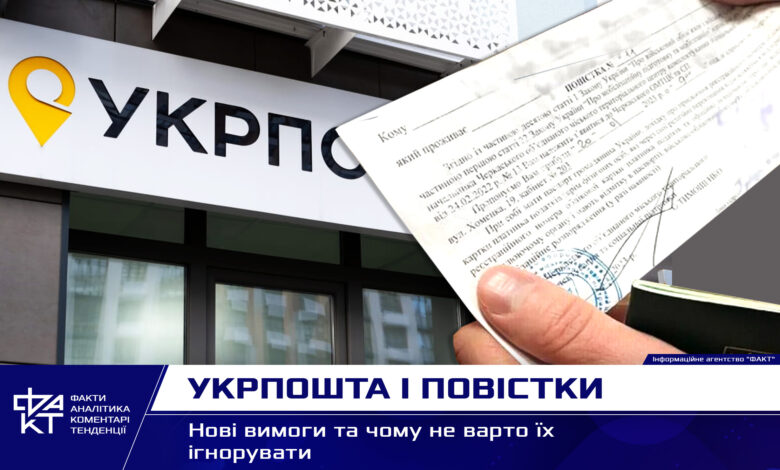Summons through Ukrposhta: how not to become a hostage to legal misunderstandings

Currently, when the issue of Ukraine’s defense capability has become a priority, the issue of serving summonses to conscripts has gained considerable relevance among the population. In the light of the current situation, many Ukrainians are concerned not only about the possibility of receiving a subpoena, but also about how to properly respond to receiving it and what are the legal aspects of this process. Recently, summonses began to be sent through Ukrposhta, which naturally raises additional questions about the legality of this procedure, its nuances and possible consequences for those who receive it or refuse to receive it. It is important to understand how to act in such situations in order not to violate the law, but also not to become a victim of ignorance.
Lawyers of the “Repeshko and Partners” Bar Association in a comment to IA “FACT” provided clarification on the issue of receiving a summons by conscripts through “Ukrposhta”.
Legal grounds for serving summonses by mail
“Ukrposhta” has the legal right to send summonses to conscripts, in accordance with the current legislation of Ukraine. In particular, the resolution of the Cabinet of Ministers of Ukraine No. 560 regulates the process of sending summons by mail. It is important to know that the summons is sent by registered letter with a detailed description of the attachment, which allows you to record its receipt or refusal to receive it. This mechanism is designed to minimize possible speculation or manipulation as to whether a person actually received a subpoena.
The postal operator’s barcode, addressee’s full name, patronymic (if any) and address must be indicated on the envelope with the summons. In the description of the attachment, information about the number of sheets, the name of the attachment, the name and surname of the head of the territorial recruitment and social support center (TCC) or its department, as well as the date of imposing a qualified electronic signature, is recorded.
The moment of service of the summons and its legal consequences
One of the key aspects of service of summons by mail is the question of when it is considered to have been officially served. According to lawyers, the summons is considered delivered from the moment when the postal operator confirms the fact of its receipt by the addressee. However, even if the addressee refused to receive it or was not present at the place of residence indicated in the territorial collection center, this is also considered service of the summons. Thus, attempts to avoid receiving a subpoena, for example, by refusing to accept it in the mail, do not exempt from responsibility.
“If the person changed his place of residence and did not notify the TCC about it, the summons is still considered served, even if it did not reach the addressee. This once again emphasizes the importance of official notification of a change of residence to avoid misunderstandings and possible legal consequences.” – lawyers emphasize.
Innovation: summonses with a QR code
As reported in the bar association, against the background of technological progress and modernization of various aspects of state administration, the Ministry of Defense of Ukraine is introducing new forms of subpoenas that will contain QR codes. This innovation is currently undergoing testing, and it is expected that QR codes will significantly simplify the identification process and reduce the opportunities for document forgery. The QR code will allow the recipient of the summons to quickly go to the appropriate electronic resource to check the authenticity of the summons or obtain additional information about their duties.
What is important for conscripts to know
According to lawyers, receiving a summons through “Ukrposhta” is not a formality, but a serious signal about the need to fulfill one’s duties to the state. Therefore, it is important to comply with legal regulations and not to avoid contacts with territorial procurement centers. At the same time, it is necessary to notify the change of residence in a timely manner and follow the updates in the legislation regulating military service.
The procedure for serving subpoenas by mail, although it has its own nuances, is absolutely legal, and attempts to avoid receiving it do not exempt from obligations to the state. The new version of summons with QR codes will further increase the transparency and convenience of this process, minimizing possible problems for recipients and military authorities.
Practical advice of lawyers on how to act when receiving a summons
- Do not ignore receiving the summons. Refusal to sign or evasion of its receipt does not exempt from military duty. This will only complicate legal relations with the military accounting authorities.
- Check the correctness of the information. After receiving the summons, you should carefully check whether all the data on it are correct. Errors in information may be grounds for appeal, but do not exempt from liability.
- Inform about changes of residence. If you have changed your address, be sure to inform the territorial collection center about this in order to avoid receiving summonses to the old address and possible consequences due to “absence” at the place of residence.
- Be ready for new forms of subpoenas. The introduction of QR codes will simplify the verification process and reduce opportunities for forgery of summonses, so you should get used to new technologies and understand that this is a step towards digitalization of government procedures.





